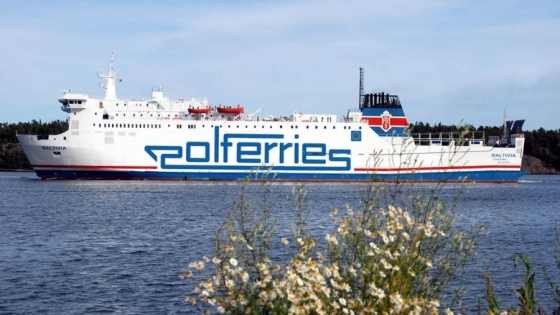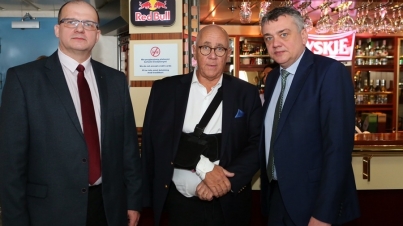News
News
People
Presentations
After Hours
Calendar
Currencies
Galleries
Advertising
About us
Contact
Adressess
Newsletter
What does future hold for PŻB?
Polferries – one of the most recognisable brands in the region put up for sale. The attempt to privatise PŻB has provoked strong emotional reactions. Among the opponents are the local authorities of West Pomerania, including their speaker, a group of local MPs and the council of Kołobrzeg. How will all this end?
 Polfferies is one of the most recognisable brands in the region.
/fot.: archive /
Polfferies is one of the most recognisable brands in the region.
/fot.: archive /
It will take at least a few weeks before we can expect an answer to the question. As a result of the objection to the privatisation raised by politicians, the Ministry of the State Treasury, who wants to sell PŻB shares with a value of about PLN 37 million, said they would reconsider the decision.
PŻB’s assets comprise three 35-year-old ferries ‘Scandinavia’, ‘Wawel’ and ‘Batavia’, and two passenger routes operated by the ship owner. At the end of December, the company added an 18-year-old ferry ‘Mazovia’ to its fleet as a replacement for ‘Scandinavia’ which is going to be sold.
Three players
Seven companies bid for PŻB shares in a tender held in October 2014. The State Treasury short-listed three of them: DFDS from Denmark, TT-Line from Germany and Finnlines Oyj from Finland. The first of the three bidders is the biggest shipping company in Northern Europe. As regards the Finnish bidder, the owner of 75 per cent shares in the company is the large Italian shipping company Grimaldi Group which recently sold ‘Mazovia’ to PŻB for PLN 140 million.
PŻM is back in the game
Among the bidders whom the Ministry of the State Treasury excluded from the short-list only a short time ago is Żegluga Polska SA owned by the Polska Żegluga Morska Capital Group operating under ‘Unity Line’ brand. The company wanted to consolidate shipping companies.
A few years ago, such consolidation was also the dream of Mr. Piotr Redemski, the former CEO of PŻB, currently in charge of the company’s business matters. His idea was to establish a strong Polish Ferry Capital Group which would be a tough competitor for Western ferry operators in the Baltic Sea. The Capital Group was to be comprised of PŻM, Euroafrica and PŻB.
Jarosław Rzepa, deputy speaker of West Pomeranian local authorities and member of the PSL party in the region is in favour of PŻM’s takeover of PŻB. On February 9th, MP Renata Zaremba from the Civic Platform, member of the Parliamentary treasury committee said at a press conference: ‘We have been discussing the future of Polska Żegluga Bałtycka with the Minister of the Treasury. Its merger with Polska Żegluga Morska is possible. Now we are talking about the future of the shipping company in the context of its consolidation with PŻM. Our intermediary in the talks is the speaker of the West Pomeranian local authorities Mr. Olgierd Geblewicz.’
Employees against privatisation
PŻB’s employees have opposed the privatisation plan from the very beginning. The company employs almost 600 people. They believe their jobs are the company’s greatest asset and fear they will be made redundant if the company is sold. They do not want their firm to go in the hands of a foreign shipping business which would become a tough competitor for the Polish company operating in the Baltic Sea. They think PŻB should remain the property of the Polish State Treasury. The trade unions and the company’s employees are campaigning to stop PŻB privatisation. They are writing letters of protest to the government. They believe the privatisation is not necessary, because the company is profitable. Financial accounts show that PŻB earned a net profit of PLN 50 million in the past two years. Furthermore, they have reported the privatisation case to the prosecutor’s office in Warsaw, accusing the Minister of the State Treasury of having acted to the detriment of the company. They want to take over the company and turn it into an employee-owned enterprise.
PŻB less valuable
The asking price for the company was nearly PLN 95 million but in December, the Ministry of Treasury reduced the price of shares to the aforementioned PLN 37 million on account of losses incurred by PŻB in previous years. ‘The share price went down form PLN 10 to PLN 3.9 as a result of a decrease in the company’s share capital registered by the registry court. The aim is to cover PŻB’s previous year losses of PLN 63 million’, Renata Zaremba explained at that time. In her opinion, the improvement in the company’s performance is only temporary. Politicians from both sides of the political scene are critical about the decision to reduce the share capital of the company shortly before its privatisation.
The region is against
A strong market position of Polfferies and a high degree of its brand awareness in the Baltic coastal area is very important for the local economy. The local parliament of West Pomerania has made it clear that it is against any actions resulting in a loss of another company which is very important for the shipping industry in the region. According to the local parliament members, the company is one of only two Polish ship owners, it is handling competitors well and remains profitable. The council of Kołobrzeg follows suit.
PŻB, operating under the Polferries brand, was established by the Minister of Foreign Trade and marine Economy in 1976. It was the first shipping company operating in the central part of the Baltic coast in Poland. The firm was commercialized in 1992, so it is reasonable to claim that the privatisation process has been in progress for 23 years, although none of the attempts to sell the ship company from Kołobrzeg has been successful.
AK
Wszystkich rekordów:












































